Woman Asks Reddit If She Is Wrong For Asking People Not To Pet Her Service Dog
Dog lovers enjoy petting dogs, and most dogs enjoy being petted. While some dog owners do not mind letting people pet their dogs in public, others do, particularly those with service dogs.
trashtheicydragon on Reddit recently shared on the AITA subreddit how people can't help but pet her service dog each time she goes out with him. In the post, trashtheicydragon said that when she first got her dog, she felt that she was finally safe to go out in public by herself.
Before getting the dog, she needed someone around in case of an episode. Although trashtheicydragon's dog is well-trained to accompany her each time she goes out, trashtheicydragon said she has reduced how often she goes out due to the attention the dog receives.
She mentioned that people of all ages usually come up to pet him without asking. Sometimes, some parents even send their kids to pet the dog or throw toys at him.
trashtheicydragon said she always tries to tell people to leave her dog alone because distracting him may cause him to miss an alert. However, people often think she's rude for asking them not to touch her dog.
trashtheicydragon wants to know whether it's wrong for her to stop people from petting her service dog because someone recently told her that it's unrealistic for her to bring a dog to a public area and expect people not to pet him.
The AITA community responded to her post like this:
Here's how it started.
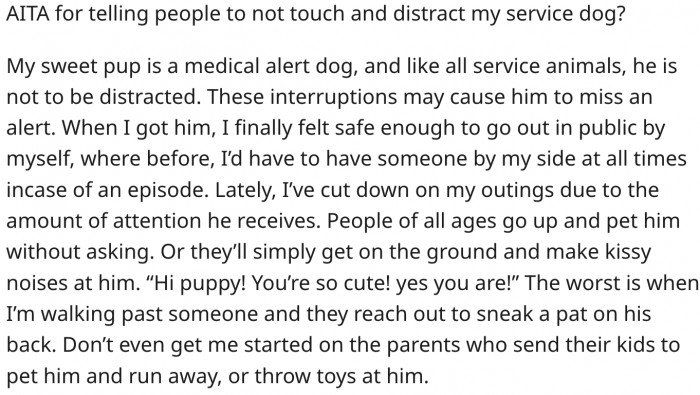
Instead, people lashed out at her. Here's how Reddit responded.
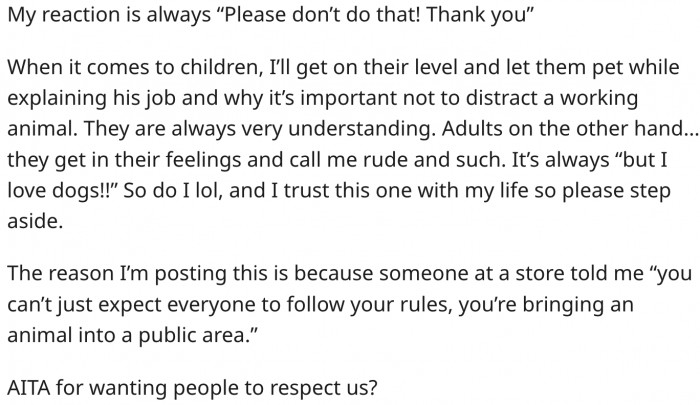
1. She should prioritize her health and never feel bad about keeping people away from her dog.

Understanding Service Animals and Their Importance
The need for service animals to remain undisturbed is critical, as they are trained to assist individuals with disabilities. A psychologist specializing in disability studies emphasizes that interactions with service animals can be distracting and counterproductive, potentially jeopardizing the safety and effectiveness of their support.
Research shows that individuals with disabilities often rely on their service animals for emotional and physical support, making it essential to respect their boundaries.
Understanding Service Dog Etiquette
Dr. Megan Ross, a clinical psychologist at the University of Minnesota, emphasizes that service dogs are trained to assist individuals with disabilities and should not be approached without permission.
Her research highlights that respecting a service dog's working status is essential for the safety and well-being of both the handler and the dog.
Interfering with a service dog can disrupt its training and the crucial assistance it provides to its owner.
2. Blunt rudeness is the best way to deal with some people.

3. Parents should teach their kids not to pet dogs without permission.

4. Service dogs should be left alone.

From a social perspective, the impulse to interact with service animals often stems from a lack of understanding about their roles. Many people view dogs as social creatures and may not recognize that service animals are working and need to focus on their tasks. This disconnect can lead to unintended consequences for both the handler and the animal.
Studies in social psychology indicate that awareness and education about service animals can significantly improve public interactions and compliance with service animal etiquette.
Social norms play a significant role in how people perceive and interact with service animals.
Studies in social psychology indicate that a lack of understanding about the purpose of service dogs can lead to inappropriate behaviors, such as attempting to pet them.
Education on service dog etiquette is vital to reduce misunderstandings and foster respect for those who rely on these animals.
5. Being assertive can help prevent unwanted petting of service dogs.
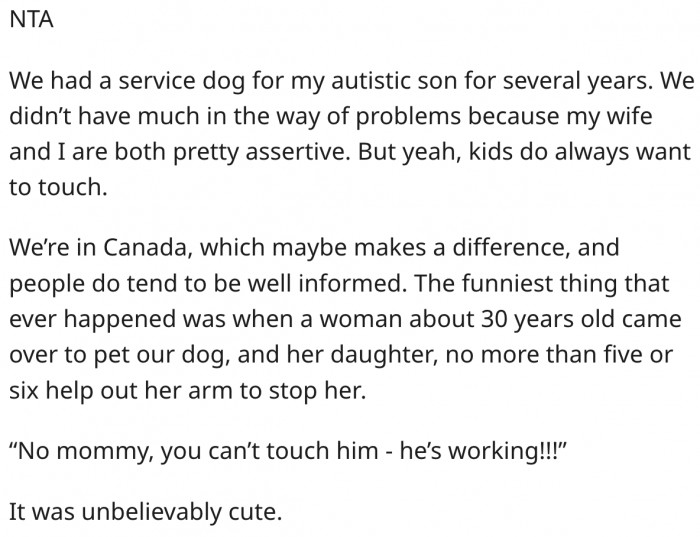
6. It's her dog, and nobody should touch him without her consent.
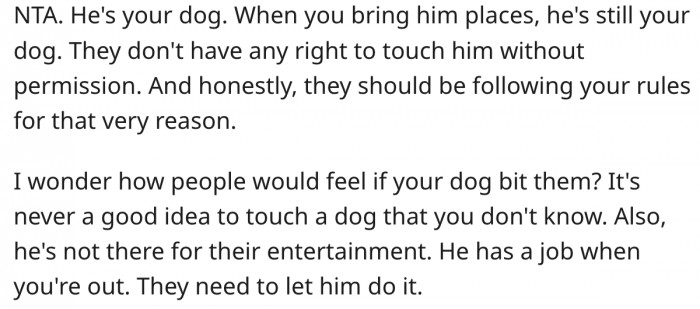
7. She shouldn't concern herself with what people will think if she stops them from petting her dog.

The Psychological Impact of Unwanted Attention
Handlers of service animals often experience heightened anxiety when their animals are approached without permission. This anxiety can stem from a fear of losing control over the animal or the potential for misunderstanding by the public.
Research suggests that social anxiety can be exacerbated in individuals who rely on service animals, making it even more important for the public to respect boundaries.
The Psychological Impact of Service Animal Interference
When individuals approach service dogs without consent, it can create significant stress for both the handler and the animal.
Research published in the Journal of Applied Animal Welfare Science shows that disruptions during service tasks can lead to anxiety and diminished performance in service animals.
This underscores the importance of educating the public to respect the boundaries of service animals.
8. A dog is not public property that anyone can touch.
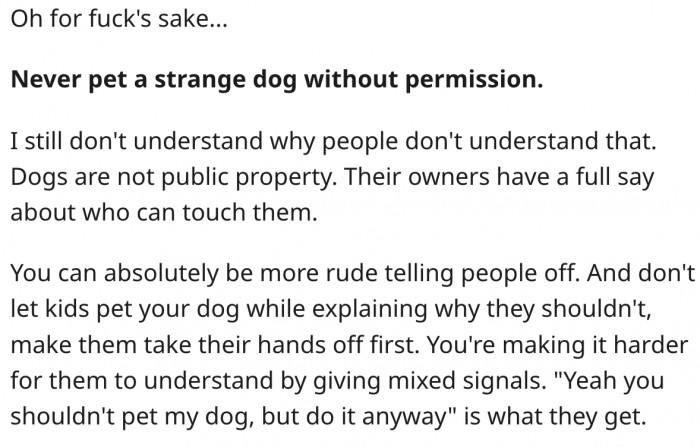
9. She should wear dog clothes that tell people he shouldn't be petted.

10. She has the right to protect her service dog from pets.

Educating the public about service animal protocols can help mitigate these concerns. Initiatives aimed at raising awareness about the importance of service animals and their work can foster a more understanding environment.
Studies show that community education programs can reduce stigma and improve interactions between service animal handlers and the public, ultimately leading to better experiences for everyone involved.
To navigate these interactions, experts suggest clearly communicating the need for space.
Using signs or verbal cues can help others understand that the service dog is working and should not be approached.
Empowering individuals with service dogs to assert their needs can also foster a more respectful environment.
11. Service dogs have a hard time working nowadays because some dog owners wear non-service dog clothes that suggest they are one.
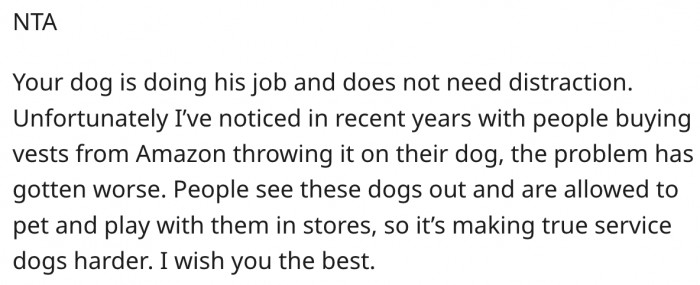
12. Her dog's duty is a matter of life and death.
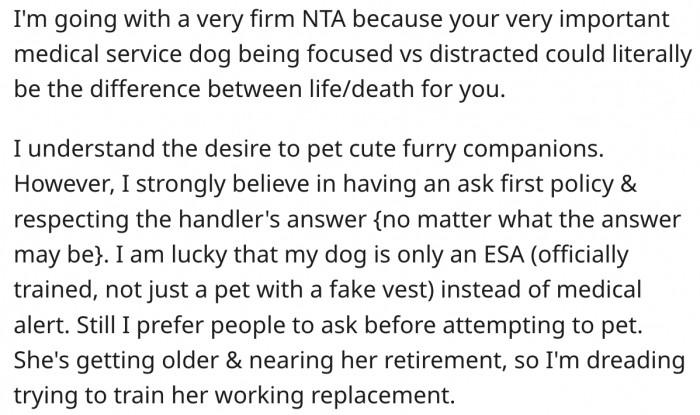
13. She should disregard people's comments and do what's best for her dog.
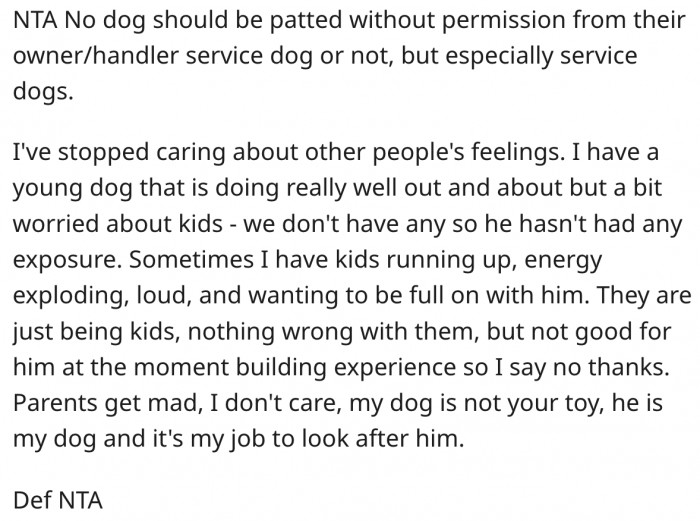
Promoting Respectful Interactions with Service Animals
To encourage respectful behavior, public campaigns highlighting the importance of leaving service animals undisturbed could be beneficial. Research indicates that public awareness campaigns can effectively change behavior by informing people of the implications of their actions.
Implementing clear signage in public spaces can also serve as a reminder to maintain distance from service animals, helping to create a culture of respect.
Building Awareness Around Service Dogs
Public awareness campaigns can be effective in educating communities about the role of service dogs.
Research indicates that increased awareness can reduce stigma and misconceptions surrounding service animals.
Collaborating with local organizations to promote understanding can create a more inclusive environment for individuals with disabilities.
14. You shouldn't ask for permission to pet a service dog.
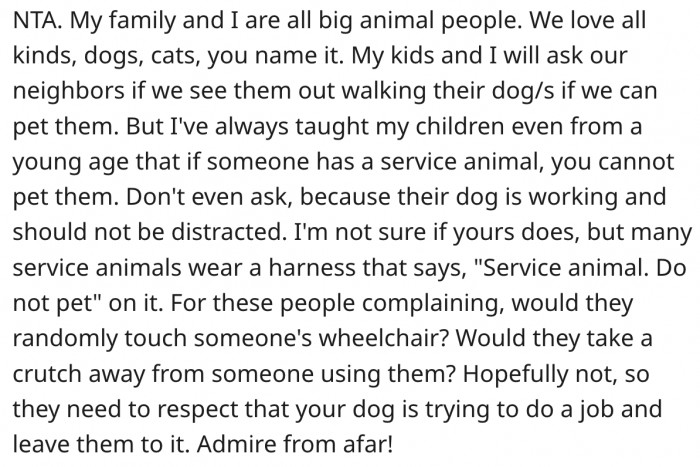
15. People can't help but pet service dogs because they are special.
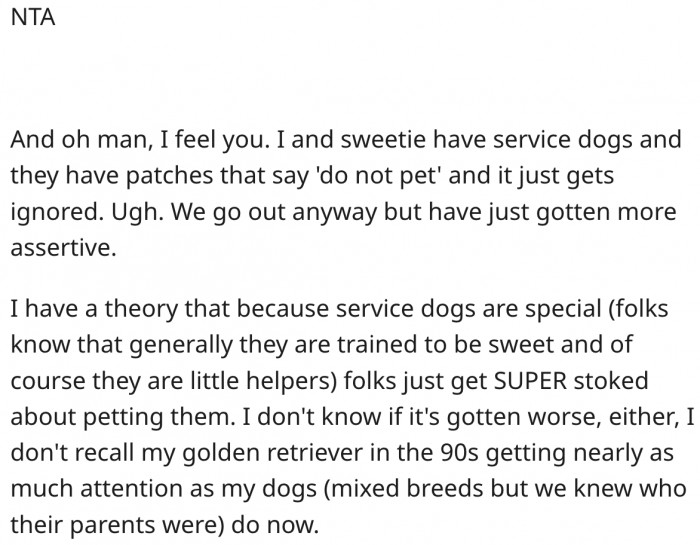
16. There's nothing wrong with demanding that people respect her dog.

Furthermore, training programs for service animal handlers can include strategies to educate the public effectively. Providing handlers with tools to explain their service animals' roles can reduce misunderstandings and encourage appropriate interactions.
Research supports the idea that well-informed handlers can foster more positive interactions with the public, leading to greater respect for service animal boundaries.
Community engagement is vital for fostering respect and understanding toward individuals with service animals.
Studies show that community programs that include individuals with disabilities and their service dogs can enhance empathy and reduce fear or misunderstanding.
Encouraging positive interactions within the community can lead to greater acceptance and support.
17. She should check what local laws say concerning distracting service dogs.
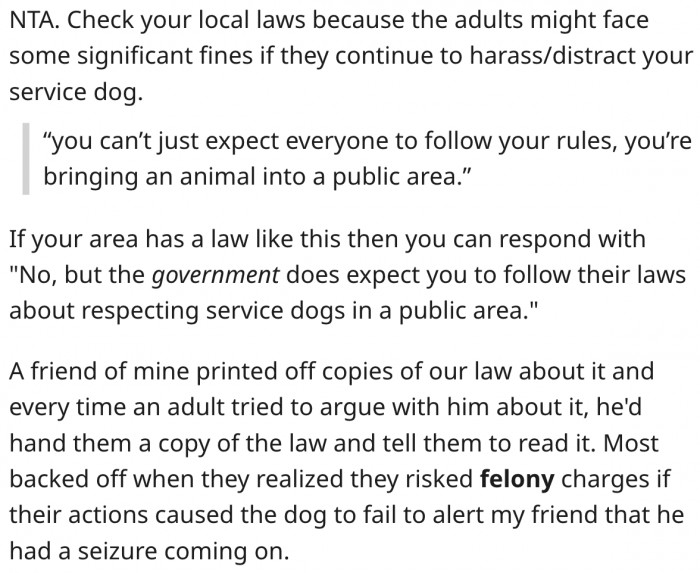
18. People should know better than to endanger others' lives by petting their service dogs.

19. She should be firm when asking people to leave her dog alone.
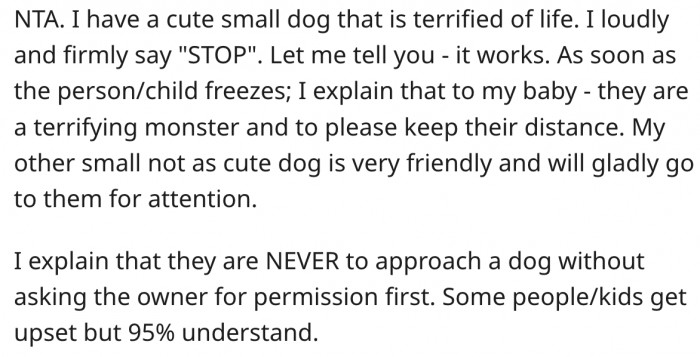
The Role of Empathy in Service Dog Interactions
Developing empathy towards individuals with service dogs can improve social interactions and reduce stigma.
Research suggests that empathy is a powerful tool for bridging gaps in understanding, leading to more respectful behaviors.
Encouraging community discussions around disability and service animals can foster a culture of respect and support.
20. Many people lack manners.

What Do You Think?
Many dog lovers can't resist the urge to pet a dog. However, service dogs are not just any dog; they are dogs trained to assist individuals with disabilities.
Since service dogs perform tasks that may result in life-and-death situations, distracting them can have fatal results. It is also disrespectful and dangerous to pet another person's dog without permission.
To address the challenges faced by individuals with service dogs, advocacy groups can play an essential role in promoting education and awareness.
Studies highlight that advocacy efforts can lead to legislative changes that enhance the rights and protections of individuals with disabilities.
Supporting these initiatives can help create a more equitable society for all.
The Importance of Respecting Boundaries
Respecting the boundaries of service dogs is critical for ensuring their effectiveness and the safety of their handlers.
Research shows that clear boundaries can facilitate smoother interactions and reduce anxiety for both the dog and the person they assist.
Fostering a culture of understanding and respect can enhance the quality of life for individuals who rely on service animals.
Psychological Analysis
This situation illustrates the challenges faced by individuals with service dogs when public awareness and understanding are lacking.
Encouraging respectful interactions and educating the public about service dog etiquette can greatly improve the experiences of individuals with disabilities.
Analysis generated by AI
Analysis & Alternative Approaches
In conclusion, understanding and respecting service dog etiquette is essential for fostering supportive environments for individuals with disabilities. According to Dr. Ramani Durvasula, clinical psychologist, "Promoting awareness and empathy towards service animals not only benefits the individuals who rely on them but also enriches the community as a whole." By educating communities and advocating for respect, we can create a more inclusive society.
Analysis & Alternative Approaches
In summary, understanding the role of service animals and promoting respectful interactions are crucial for the well-being of both the handlers and the animals. Education plays a vital role in reducing misunderstandings and fostering a culture of respect. By implementing public awareness campaigns and providing training for handlers, we can create a more inclusive environment for individuals relying on service animals.



